|
|
|
Sort Order |
|
|
|
Items / Page
|
|
|
|
|
|
|
| Srl | Item |
| 1 |
ID:
151474
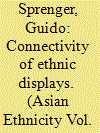

|
|
|
|
|
| Summary/Abstract |
In Laos, cultural festivals and other forms of ethnic display communicate locality and ethnicity to external agencies, in particular the nation state. This article documents strategies of identity-making in a small festival that was staged spontaneously in a Rmeet (Lamet) village. The chosen representations were conventional: dance, music, clothing. The Rmeet thereby employed a festival code used by numerous minorities worldwide. But these recently invented traditions are continuous with earlier representations that addressed various categories of strangers, including historic states and non-state groups. What has changed is the connectivity of the representations. Dance or costume used to represent external relationships in the past, but have been recoded for present use. Moreover, Rmeet have appropriated a New Year’s festival invented by the neighboring Khmu. Thus, ethnic displays appear as the most recent way of communicating difference in a code that connects them with the state, neighboring ethnicities, and a global language of locality.
|
|
|
|
|
|
|
|
|
|
|
|
|
|
|
|
| 2 |
ID:
151470
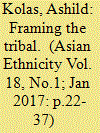

|
|
|
|
|
| Summary/Abstract |
This article examines the framing of ‘ethnic conflict’ in Northeast India, focusing on militant groups and insurgency in the hill areas of Assam and a form of political violence known locally as ‘ethnic clashes’. The article argues that ‘ethnic clashes’ have become an institutionalized form of armed violence in the region, while ‘ethnic rivalry’ is a key diagnostic frame for conflict. As enactments and imaginaries of institutionalized violence, ‘ethnic clashes’ are a product of actors who hold stakes in representing armed political violence as a result of ‘ethnic conflict’ between rivaling tribal communities. The article looks at the representation of causes of conflict as well as the framing of acts of violence as key sites of contestation, and thus as integral aspects of the conflict. This raises questions about the feasibility of scholarly efforts to make sense of specific cases of conflict via generic categories such as the ‘ethnic conflict’.
|
|
|
|
|
|
|
|
|
|
|
|
|
|
|
|
| 3 |
ID:
151475
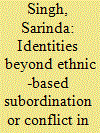

|
|
|
|
|
| Summary/Abstract |
This paper explores everyday expressions of identity by Lao villagers living in northeast Cambodia near the border with Laos, and uses this to reflect on trends in studies of identity in the remote borderlands of Southeast Asia. I argue that while ethnicity is certainly crucial, discipline-specific emphases – ethnic-based subordination or conflict for social studies and political studies, respectively – result in less attention to other important dynamics shaping identity. Furthermore, I suggest that low-profile case studies not strongly linked to ethnic-based subordination or conflict – such as the Lao in Cambodia – require study for a more comprehensive view of identity in the borderlands. The case study from northeast Cambodia identifies four key dynamics shaping identity: inter-state relations, ethno-national identities, cross-border livelihoods and social status. I show how minimal inter-state tensions and varied personal connections to Laos were important in facilitating villagers’ involvement in lucrative illegal cross-border logging in Laos, but the latter were never used to justify this practice. Instead in this everyday setting, villagers emphasised their sense of marginalisation within Cambodia and thus demonstrate their regular prioritisation of status.
|
|
|
|
|
|
|
|
|
|
|
|
|
|
|
|
| 4 |
ID:
151472
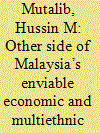

|
|
|
|
|
| Summary/Abstract |
Many governments, in their zeal to progress and deliver the fruits of development, are caught in a web of unsavory habits and practices that impair not only their international image but also domestic legitimacy. One such perennially persistent and resilient disease is ‘money politics.’ Taking Malaysia as a case study, we note that despite sustaining a remarkable record of economic and multiethnic stability, the country has also been helpless in mitigating this obstinate issue. In this article, it is posited that the phenomenon is not a new or recent portent but has actually persisted even prior to independence. We shall then contend that unless the ruling Barisan Nasional (BN) coalition government attaches greater priority in stamping out this political bug, the country’s otherwise enviable development trajectory and the quest to reach a ‘developed nation’ status via its Vision 2020 declaration, even if fulfilled, are not cause for celebration, given its implications to the country’s economic sustainability and multiethnic stability.
|
|
|
|
|
|
|
|
|
|
|
|
|
|
|
|
| 5 |
ID:
151471
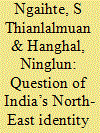

|
|
|
|
|
| Summary/Abstract |
The question of India’s North-East identity and solidarity has been a subject of debate among scholars, academicians and others. Apologia to a collective North-East believes in the existence of North-East identity and solidarity. Against the apologia’s stands are the critique who rather brushed aside North-East collectivity and questioned the clubbing together of the region as one entity. This article highlights some of the contrasting views of understanding India’s North-East, and takes the issue further by proposing to call these contending paradigms as the ‘apologists’ and the ‘sceptics’. We further argue that despite their apparent ‘antithesis’, both paradigms are related.
|
|
|
|
|
|
|
|
|
|
|
|
|
|
|
|
| 6 |
ID:
151469
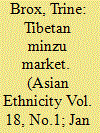

|
|
|
|
|
| Summary/Abstract |
In downtown Chengdu a pocket of Tibetan culture has sprung up: a Tibetan market where Tibetans and Han Chinese meet to buy and sell ethnic minority products. Pointing to how Tibetan migration to Chengdu has contributed to the growth of a vibrant ‘minzu market’ attracting Tibetan and Han Chinese merchants, customers, Buddhist devotees, and voyeurs, this article presents novel understandings of the ethnic goods market in urban Chengdu. The article first explores the growth of the market, which is the result of a history of political and economic reforms, increased mobility, and religious revival. Second, it maps the market infrastructure according to the ethnicity of the shopkeepers and the commodities that are traded. Although there is still a clear ethnic division in the market, this article also documents the emergence of Han Chinese market participation in forms of trade that have historically been dominated by Tibetans.
|
|
|
|
|
|
|
|
|
|
|
|
|
|
|
|
| 7 |
ID:
151473


|
|
|
|
|
| Summary/Abstract |
Current debates on Karen identity have tended to focus on the development of a nationalist construct of a pan-Karen community. This article moves beyond this notion to explore a Karen identity that is being recast in the form of a human rights discourse where the Karen construct, adapt, and reify the social aspects of their political identity in order to establish a claim to a political self, where they protest the persecution and discrimination waged against them as well as larger claims around governance and political representation. This human rights discourse is framed by increased emphasis in the Thai–Burma borderlands on a human rights framework to address Burma’s ongoing conflict. Such an argument has the potential to move current debates beyond the more militant ethno-nationalist discourses of the Karen identity and develop an adequate framework for the practices of identity, which occur among displaced Karen in the Thai–Burma borderlands.
|
|
|
|
|
|
|
|
|
|
|
|
|
|
|
|
|
|
|
|
|